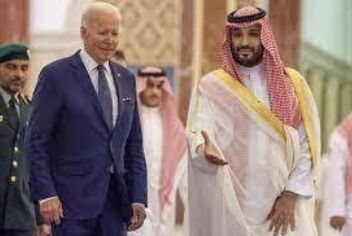U.S. and Saudi Arabia Explore Potential Defense Alliance, Marking a Shift in Middle East Dynamics
American and Saudi officials are reportedly discussing a potential defense alliance, as part of President Biden's efforts to encourage Saudi Arabia to normalize relations with Israel. The proposed agreement would include mutual military support and assistance in developing a civilian nuclear program. However, concerns about Saudi reliability and entanglement in West Asia could hinder the treaty's progress. The discussions come after Biden's emphasis on facilitating normalization agreements at the UN, and Prime Minister Netanyahu's meetings with world leaders. US Secretary of State Blinken's upcoming visit to the region further underscores ongoing diplomatic engagement.
In a significant development, American and Saudi officials are reportedly in discussions about a potential defense alliance between the two countries, similar to the robust military pacts that the US has with its allies Japan and South Korea. This move is seen as a central component of President Biden's diplomacy efforts to encourage Saudi Arabia to normalize relations with Israel. Under the proposed agreement, both countries would pledge to provide military support to one another if either country is attacked in the region or on Saudi territory. It is worth noting that these discussions have not been previously reported.
The Crown Prince of Saudi Arabia, Mohammed bin Salman, considers a mutual defense deal with the US to be crucial in his talks with the Biden administration, particularly in relation to Israel. The Saudi officials argue that such an alliance would help deter potential assaults by Iran or its armed partners, despite the recent re-establishment of diplomatic ties between the two regional rivals.
Furthermore, Prince Mohammed has also requested the assistance of the US in developing a civilian nuclear program, which has raised concerns among some US officials who fear it could be a cover for a nuclear weapons program aimed at countering Iran. However, any defense treaty with Saudi Arabia resembling the American pacts with East Asian allies is expected to face strong objections in Congress. Several senior US lawmakers, including top Democrats, view the Saudi government and Prince Mohammed as unreliable partners who prioritize their own interests over those of the US and human rights concerns.
Moreover, such an agreement would raise questions about whether the Biden administration is further entangling the US militarily in West Asia, contradicting its stated goal of reorienting military resources towards deterring China in the Asia-Pacific region. The report of these discussions emerges following President Biden's recent remarks at the United Nations General Assembly, where he highlighted US efforts to facilitate normalization agreements between Israel and Arab countries, including Saudi Arabia.
Meanwhile, Prime Minister Benjamin Netanyahu of Israel has been engaged in a series of meetings with world leaders at the UNGA, including German Chancellor Olaf Scholz, Ukrainian President Volodymyr Zelensky, and Turkish President Recep Tayyip Erdogan. Netanyahu is also scheduled to meet with President Biden to discuss strategically significant issues such as Iran's nuclear program and the negotiation of an agreement with Saudi Arabia. The visit of US Secretary of State Antony Blinken to Israel and the Palestinian Authority next month is also anticipated, further highlighting the ongoing importance of diplomatic engagement in the region.




